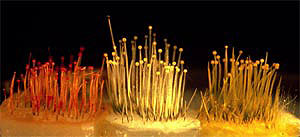The zygomycete fungus Phycomyces blakesleeanus has been investigated over several decades for the variety and sensitivity of its responses to light, particularly the phototropism of the giant fruiting body, the sporangiophore. Other light responses investigated in detail are the regulation of sporangiophore development and the regulation of the biosynthesis of beta-carotene. In addition, the Phycomyces sporangiophore is sensitive to a variety of environmental stimuli, including gravity, touch, wind, and the presence of nearby objects. The Phycomyces genome sequence will help to start a genomic approach that will complement the current research carried out with this organism. Moreover, the sequence of the Phycomyces genome will help to identify genes and proteins that could participate in the signal transduction pathways for responses to environmental cues. The identification of the full set of Phycomyces genes will allow the design of microarrays for whole-genome assays of gene expression to investigate the responses of Phycomyces to environmental signals. The sequence of the Phycomyces genome will significantly accelerate research into the molecular details of Phycomyces’ precisely regulated responses. The full description of a zygomycete genome will provide key information about the evolution of fungal genomes.

Phycomyces fungi, showing sporangiophores (fruiting bodies)
in the wild type and color mutants. Photo by Tamotsu Ootaki.
CSP project participants: Luis M. Corrochano (Univ. of Seville), Scott E. Baker (Pacific Northwest Natl. Lab.), and Ed Braun (Univ. of Florida).